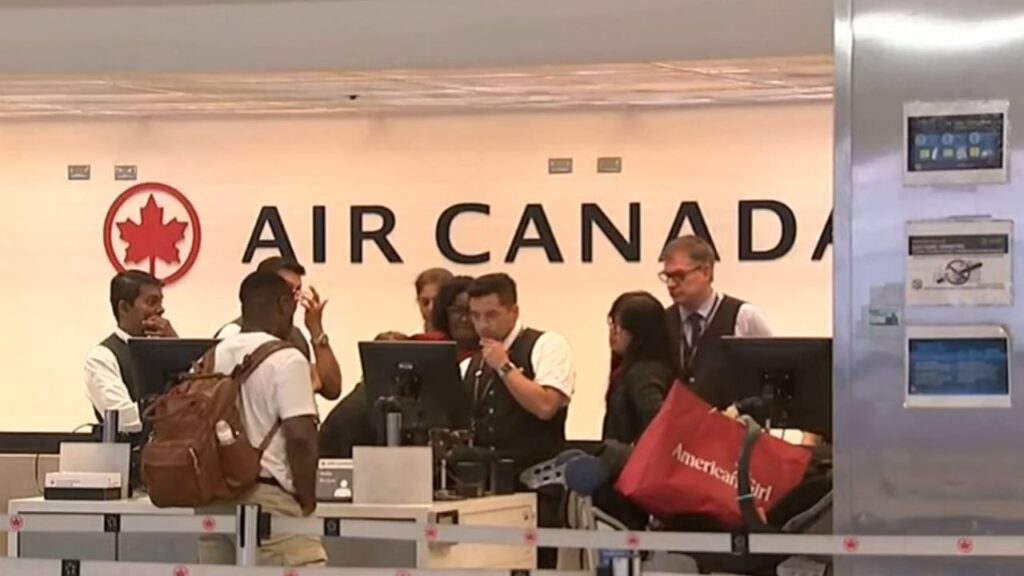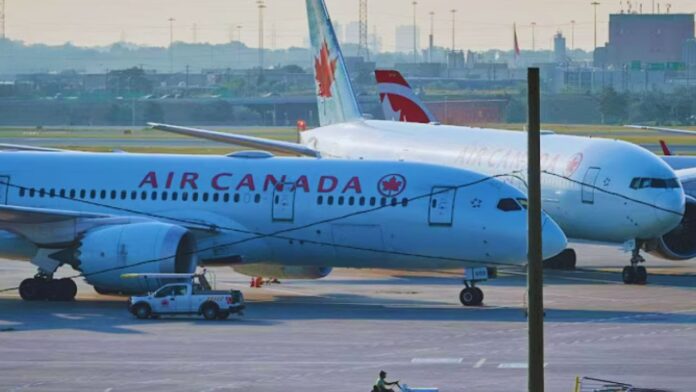Air Canada has announced that it will resume flights on Sunday evening after the Canadian government stepped in to end a massive strike by its cabin crew. The strike, which began on Saturday, August 16, 2025, brought the airline’s operations to a near standstill, forcing the cancellation of around 700 flights per day and leaving more than 100,000 passengers stranded worldwide.
The government’s decision to intervene came after two days of chaos across airports in Canada, the United States, and international destinations. With thousands of travelers stuck at terminals, Canadian Jobs Minister Patty Hajdu directed the Canada Industrial Relations Board (CIRB) to issue a back-to-work order and move the dispute to binding arbitration. The CIRB instructed all Air Canada and Air Canada Rouge flight attendants to report back to work by 2 p.m. ET on Sunday (1800 GMT).
Why the Strike Happened: Pay for “Unseen” Work
This strike marked the first walkout by Air Canada flight attendants since 1985, highlighting the depth of frustration among employees. The central issue revolves around how flight attendants are paid.
Currently, Air Canada cabin crew are only paid once the aircraft doors close and the plane begins moving. This means that time spent:
- Greeting passengers during boarding
- Assisting with luggage storage
- Managing passenger safety checks
- Helping with seating or ground delays
…is unpaid labor.
The Canadian Union of Public Employees (CUPE), which represents more than 10,000 flight attendants, says this amounts to nearly 35 hours of unpaid work per month per employee. They argue that when unpaid ground duties are factored in, hourly wages often fall below Canada’s minimum wage standard.
This issue is not unique to Air Canada. Flight attendants at several major airlines worldwide have long raised concerns about unpaid duties. However, in Canada, the dispute escalated into a full-scale strike after months of stalled negotiations.
Air Canada’s Offer vs Union Demands
Air Canada had tabled an offer that included:
- A 38% pay increase spread across four years
- Partial compensation for time spent during boarding
- Other benefit adjustments
But the union rejected the proposal, calling it insufficient to cover inflation and still failing to pay fully for boarding, delays, and passenger assistance. CUPE maintains that Air Canada flight attendants are underpaid compared to peers at U.S. and European airlines, despite the airline being Canada’s largest and one of North America’s biggest carriers.
Disruption for Passengers

The scale of disruption was enormous:
- 700 daily flights canceled across domestic, U.S., and international routes.
- More than 100,000 passengers stranded, many forced to sleep in airports.
- Toronto Pearson International Airport, Montreal Trudeau International Airport, and Vancouver International Airport saw long lines, frustrated travelers, and hundreds of rebookings.
- Travelers reported conflicting updates — some were told flights could resume in hours, others that it could take over a week.
Air Canada admitted that even with flights restarting, full normalization of schedules may take 7–10 days, given the complexity of crew scheduling, aircraft rotations, and the backlog of stranded passengers.
Government’s Use of Emergency Powers
The government’s intervention has been controversial. Minister Patty Hajdu used her emergency authority under Section 107 of the Canada Labour Code, which allows Ottawa to end work stoppages that threaten public health or safety, or that cause severe damage to the national economy.
The CIRB, acting on the government’s directive, ruled that Air Canada must resume flights immediately and extend the expired collective agreement (which lapsed on March 31, 2025) until a new one can be negotiated through arbitration.
Air Canada welcomed this decision, saying it brought “certainty and stability” to operations. The airline had earlier called on Prime Minister Mark Carney’s Liberal government to step in.
However, the union strongly opposed binding arbitration, saying it removes pressure from the airline to negotiate fairly. CUPE leaders accused the government of siding with corporate interests and vowed to keep pushing for a negotiated settlement rather than forced arbitration.
Union Defiance and Ongoing Tensions
Even after the CIRB’s return-to-work order, CUPE signaled that its members would continue striking until a fair deal was reached. The union described the government order as unconstitutional and an attack on workers’ rights to collective bargaining.
This set the stage for a possible legal showdown between the union and the government, raising questions about the balance between protecting the economy and protecting labor rights.
Wider Impact on Canada’s Economy
The strike has highlighted the strategic importance of Air Canada to the Canadian economy. As the country’s largest carrier:
- It handles a significant share of domestic travel.
- It is a key connector for transatlantic and transpacific flights.
- It supports Canada’s $100-billion-plus tourism industry.
Economists warned that the strike, if prolonged, could have damaged Canada’s post-pandemic travel recovery and disrupted supply chains that rely on passenger aircraft for air cargo.
What Happens Next
- Arbitration: With the CIRB’s ruling, negotiations will now be overseen by a neutral arbitrator. The outcome could set a precedent for how unpaid ground time is handled in Canadian aviation.
- Union Strategy: CUPE says it will explore all legal options, including court challenges, to fight what it calls an unconstitutional directive.
- Passengers: Those stranded may face disruptions for days as the airline works to re-route and rebook travelers. Compensation claims are likely to surge.
Why This Strike Matters Beyond Air Canada
The Air Canada strike is more than just a labor dispute. It has raised critical questions:
- Should airline staff be paid for all work hours, not just airborne time?
- How far should governments go in using emergency powers to protect the economy?
- Could this strike spark similar labor actions at other airlines, both in Canada and globally?
Labor experts say the strike could influence future negotiations in aviation worldwide, especially as airlines face worker shortages, rising demand, and higher passenger expectations.
Air Canada’s resumption of flights brings temporary relief to passengers, but the deeper conflict between the airline and its cabin crew is far from resolved. With binding arbitration now in place, both sides have lost some control over the outcome. For passengers, the next week will still mean long waits, cancellations, and a slow return to normal travel schedules.
This historic strike has put the spotlight on a long-ignored issue in aviation — unpaid labor for essential duties. Whether the arbitration process delivers a solution that satisfies workers, protects passengers, and sustains the airline’s financial health will shape labor relations in Canadian aviation for years to come.
The information is Collected from NBC News and CNN.



















![10 Countries With the Best Healthcare in the World [Statistical Analysis] Countries With the Best Healthcare in the World](https://articleify.com/wp-content/uploads/2025/07/Countries-With-the-Best-Healthcare-in-the-World-1-150x150.jpg)









![20 Most Beautiful Bucket-List Castles in The World [Ranked] Most Beautiful Bucket-List Castles in The World](https://articleify.com/wp-content/uploads/2025/08/Most-Beautiful-Bucket-List-Castles-in-The-World-150x150.jpg)